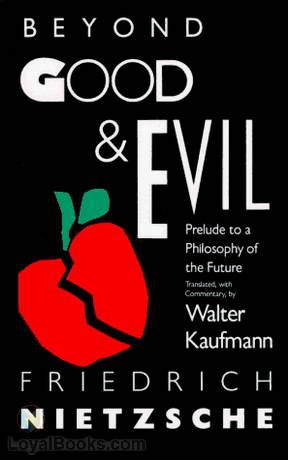
Beyond Good and Evil, by Friedrich Nietzsche
A searing indictment of concepts like “truth” and “language” Beyond Good and Evil, by Friedrich Nietzsche is a deeply thought provoking book that forms one of the keystones of modern thought and politics.
In this book, Nietzsche takes the position that our subservience to fixed perspectives that are forced on us by our language and our ideals make us incapable of perceiving reality. He propounds the theory that ideals are not fixed but change over time, often dramatically, and end up becoming the exact opposite of what they originally were. For instance an abstraction like “good” could mean anything depending on who is using it. Wars have been fought, people have been silenced, disease and destruction have been let loose based on what is considered “good” by certain countries and people in power. Hence, the meaning and interpretation of words really depend on the will that chooses to manipulate them. The will in turn is subject to a shifting and eternally changing viewpoint, based on the power and status of those who operate it. Nietzsche then goes on to propose a new way of thinking that goes beyond such concepts like “good” and “evil.”
These and other such concepts are a bold and revolutionary way of looking at the way human beings reflect, act and justify their actions. We begin to see the world not in terms of just linear, black and white or binary terms but as a more complex, multidimensional entity, where sometimes contradictory concepts seem to coexist.
Beyond Good and Evil is divided into nine chapters with an epilogue entitled “Aftersong – From the High Mountains” a long narrative poem in which the narrator calls upon his friends to join him on the mountain top. However, when his friends arrive, they don’t recognize him. He has become hard and aggressive after living for so long in such inhospitable terrains. They begin to leave one by one and the narrator waits for new friends to arrive, as he realizes that concepts like friendship can never be fixed or eternal.
_
Friedrich Nietzsche was born in the old Prussian province of Saxony. His father died when Nietzsche was a child and he was brought up by his mother and her family. He attended a private school with famous contemporaries like Wagner, Krug and Pinder. His interest in music and languages was encouraged by his mother and he joined the Schulpforta where he studied several languages and got a firm grounding in poetry and music. He went on to study theology and philosophy and later joined the Prussian army. He was injured in the war and after leaving the army, began to work as a professor in Basel, Switzerland. From this time on, he was plagued by ill-health and with financial and emotional support from his friends, began to devote time to writing and compiling his thoughts on philosophy. He suffered a mental breakdown and finally died of multiple illnesses in 1900.
_
Many great Western philosophers like Heidegger, Foucault and Sartre owe a great deal to Nietzsche other writers like Shaw and Yeats based many of their imaginative writings on his thoughts. Freud was another pioneer who was heavily influenced by Nietzsche’s concepts. Beyond Good and Evil is indeed a great addition to your collection of philosophical books.

Other Audiobook
Audiobook: Selections from The Army and Navy Hymnal, Volume 1
This collection was a joint effort by the chaplains of the US Army and the
Audiobook: Power of Concentration
A series of twenty lessons designed to help develop and improve the power of concentration.
Audiobook: Sand Doom
The problem was as neat a circle as one could ask for; without repair parts,
Audiobook: Selection of the Most Celebrated Sermons of John Calvin
In offering this selection of Sermons to the publick, the publisher has not been governed
Audiobook: Prince (Version 3)
The Prince (Italian: Il Principe) is a political treatise by the Italian diplomat, historian and
Audiobook: Voyage Out (Version 2)
Rachel Vinrace embarks for South America on her father’s ship and is launched on a
Audiobook: True Stories from History and Biography
In writing this ponderous tome, the author’s desire has been to describe the eminent characters
Audiobook: Dialogues (Διάλογοι )
Στους διαλόγους του ο Πλάτωνας (427 π.Χ. – 347 π.Χ.) παρουσιάζει τις φιλοσοφικές του θεωρίες
Audiobook: American Egypt
Arnold and Frost were English archaeologists who traveled to the Yucatan Peninsula and wrote “the
Audiobook: Geschichte des Abfalls der vereinigten Niederlande von der spanischen Regierung
Schiller, einer der Weimarer Klassiker, bekannt als Dichter und Dramatiker, beschreibt in meisterhaftem Deutsch den
Audiobook: Celebrated Crimes, Vol. 1: The Borgias and the Cenci (version 2)
Dumas’s ‘Celebrated Crimes’ was not written for children. The novelist has spared no language–has minced
Audiobook: Short Story Collection Vol. 053
A collection of 20 short works of fiction in the public domain read by a